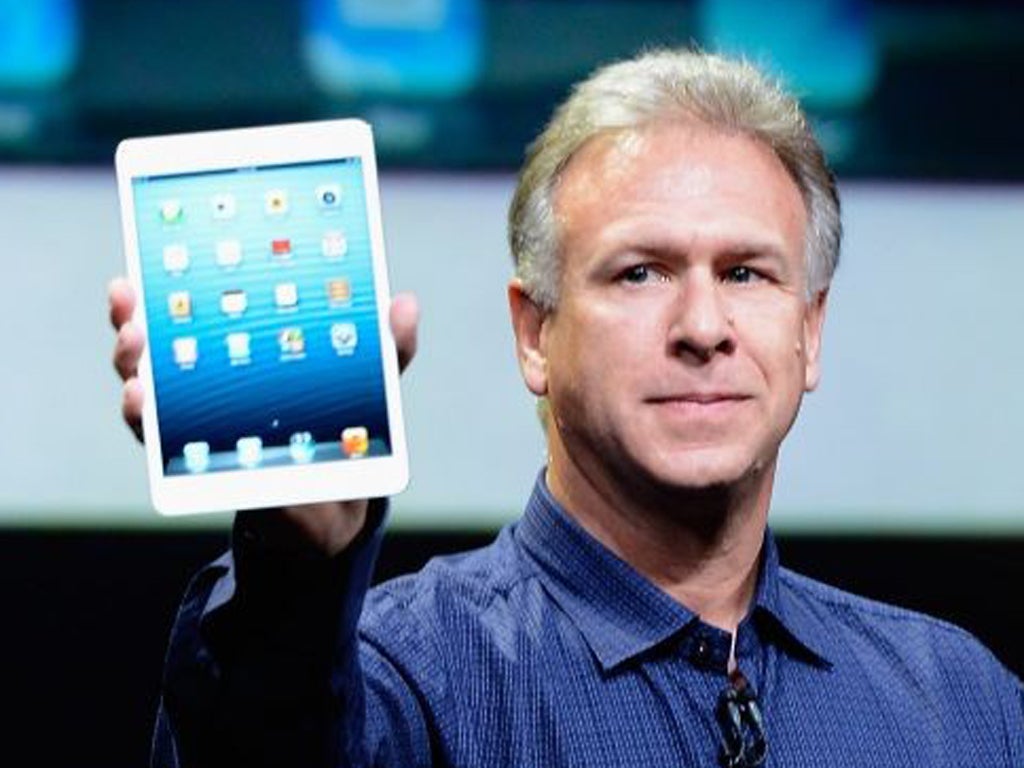Hands on: First review of Apple's 'iPad mini' - can it snatch sales away from Google and Amazon?
Apple unveils the incredible shrinking iPad as it downsizes to meet challengers

Fancy an iPad but find it just too big and heavy? Apple has an alternative. Mind you, so does Google. And Amazon.
Last night in San Jose, California, Apple’s CEO Tim Cook, in supremely relaxed form, and his team, announced its latest tablet computer, the iPad mini. It’s designed to look like a smaller version of the triumphant iPad. It’s also designed to snatch sales away from Apple’s rivals.
When the original iPad launched in spring 2010 it created a new category of electronic device. Though touchscreen laptops had existed before, none was successful. Apple created a perfect storm of desirable aluminium-and-glass hardware, a sublimely intuitive interface and an ecosystem of many thousands of quickly downloadable apps. There are now, Cook said, 275,000 apps specifically designed for the iPad and earlier this month Apple sold its 100 millionth iPad.
There have been rivals since but few have undercut Apple’s pricing – why opt for something else when you can have a real iPad for the same price? However, Amazon’s 7in screened Kindle Fire HD – on sale in the UK from Thursday – and Google’s 7in Nexus 7 have both sold well, not least because they only cost £159 each.
Compared to rivals like the Google Nexus 7 - which costs £70 less for a 16GB wi-fi version - this is lighter and much, much classier. Though the screen is almost an inch bigger than Google's, the narrow bezel means it's a decent fit in one hand, especially thanks to its slimness.
Where it really scores is in the dedicated tablet apps that gleam. Where Google has hundreds of dedicated tablet apps - the rest are resized phone apps - Apple has 275,000. The screen is as responsive and inviting as the full-sized iPad and the increased portability will make it appealing to a new range of customers.
Still, size isn’t everything – the affordably priced BlackBerry PlayBook has a 7in display and is a powerful machine. But it has not shifted in great numbers.
A smaller screen tablet is ideal for ebooks, with size and weight more suitable to holding in one hand. Apple’s iBooks store had 1.5 million titles and 400 million books have so far been downloaded.
Apple executive Philip Schiller announced a new full-size iPad – a fourth-generation model, which may not please those who bought the one that only went on sale in March. It boasted a faster processor and new connector.
When Schiller finally revealed the iPad mini, it was flat and slim – 7.2mm from front to back, and weighing 0.68lbs, lighter than a book.
Apple has chosen a slightly larger screen size than some rivals: 7.9ins, not least because the bezel on the iPad mini is noticeably slimmer than most rivals.
The screen resolution is 1024 x 768 – not a Retina Display, then, Apple’s name for a screen that has pixels so small you can’t see them individually from a regular working distance. Even so, it looked crisp, pin-sharp and colourful. Schiller compared the iPad mini to the the Google Nexus 7, claiming Apple’s superiority for web browsing, dedicated apps and more. It also has a 5-megapixel rear camera, which the Nexus lacks.
Apple exec Philip Schiller also revealed an updated MacBook Pro and a desktop computer that drew huge applause as its thin, curvy design was revealed. It was just 5mm deep at the edge, with a curvy bulge hiding the computer parts. None of the new computers included a DVD drive – Apple wants you to download movies from iTunes, thank you.
The iPad mini is on sale from 2 November for the wi-fi only version, with models including 4G. It has the same sleek design as its bigger sibling, and feels great in the hand. The price starts fat £269 in the UK. This is more than Apple’s rivals, but it is likely to take the battle to Amazon and Google with great effect.
Apple's strategy - to maintain its position as a high-quality computer manufacturer whose products cost more than the competition - didn't seem to agree with Wall Street though. As soon as the price was unveiled, a sell-off in the firm's stock accelerated. Shares ended down about 3.3 per cent, dropping more than $20.
Join our commenting forum
Join thought-provoking conversations, follow other Independent readers and see their replies
Comments
Bookmark popover
Removed from bookmarks